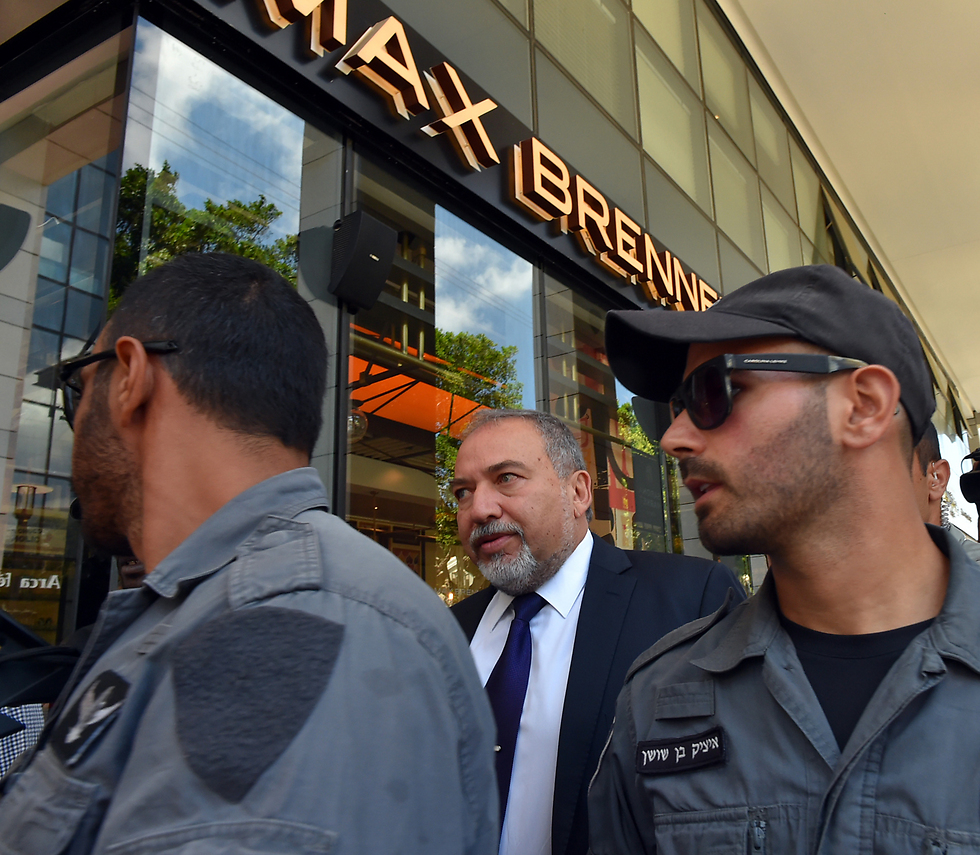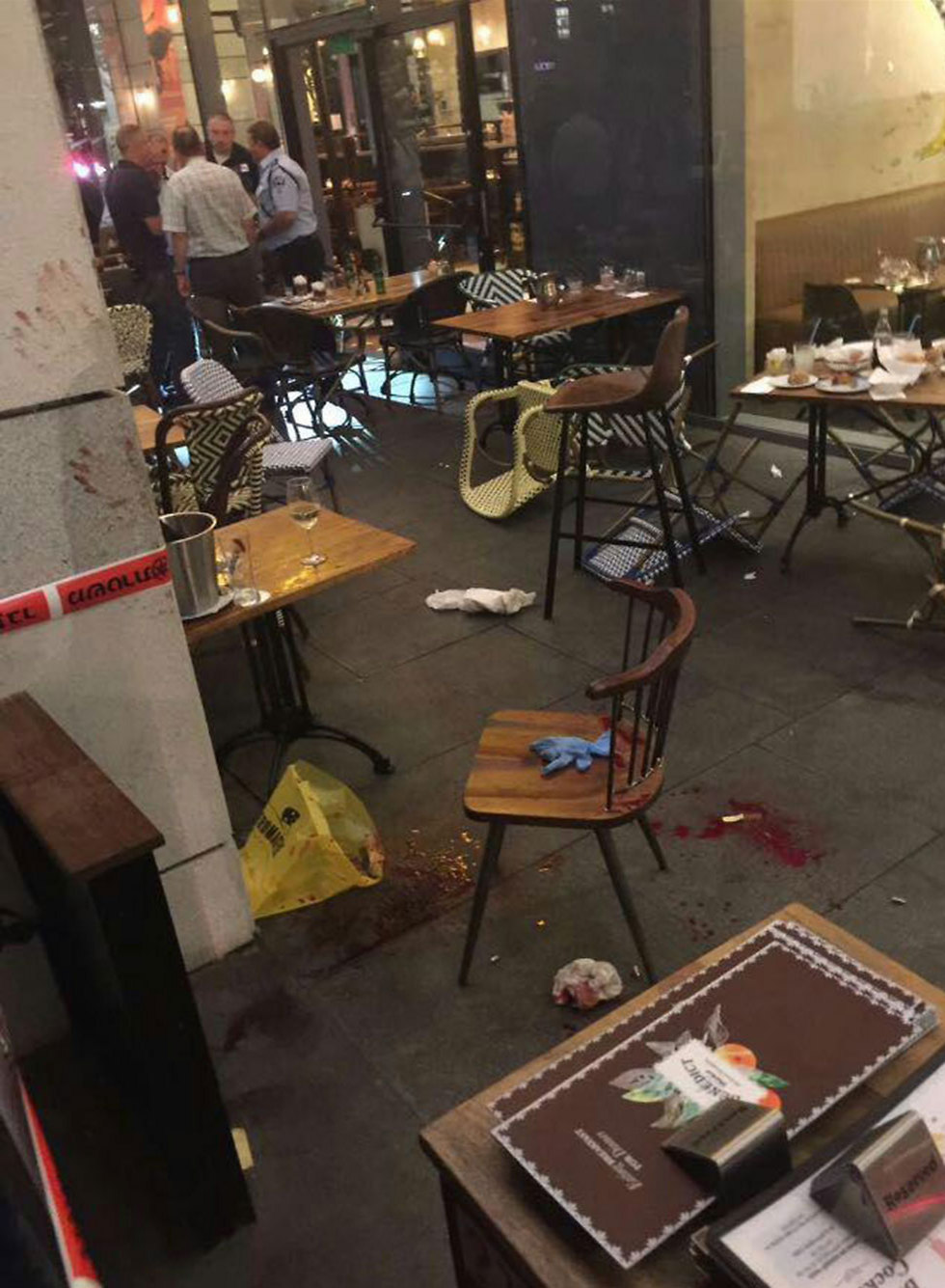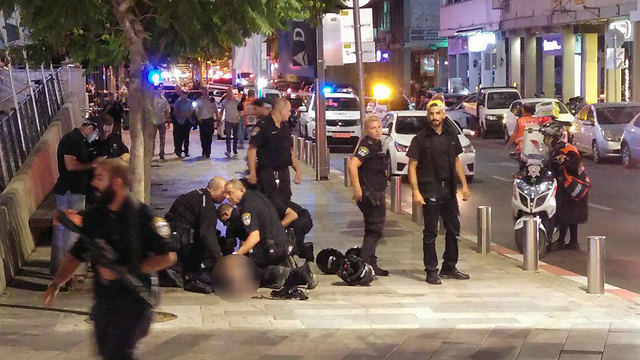
Lieberman's trial by fire
Analysis: The Sarona Market attack is a test for the new defense minister; his previous polemic must be laid aside to follow defense procedure; his initial reaction has been to stick to previous methods, leading to an unimpressive response.
He doesn't draw, doesn't criticize, doesn't shoot. The terrorist attack caught the new minister of defense, Avigdor Lieberman, running an internal consultation meeting with members of his office on the 14th floor of the Kirya (Ministry of Defense headquarters) in Tel Aviv. He barely managed to reach the memorial ceremony for fallen Nahal soldiers when a note landed on his desk from his military secretary that updated him on the attack a few hundred meters away. This is his first public test.
Lieberman knows that his every movement, every nuance in his voice, is being examined with a magnifying glass. He's expected to screw the pooch. And at the same time, his weight as the head of the defense establishment is being measured: how he stands up to the prime minister, up to the minister of public security, up to the general staff.
He is still careful to differentiate himself. He appears in a suit and tie as if to say, "I'm not going to pretend to be a military man; I'm a civilian who oversees the military."
Lieberman knows that there are those who are waiting to pounce: "Let's see you know, big hero. Let's see what you can do." But "the battle procedure"—a manner of work in the army and the Shin Bet—dictates that he is the one who sets the pace. Those who want to walk on solid ground, at least for the first months in the position, should adhere to professionals, intelligence, facts, and cold interests, leaving emotion aside. Or as Lieberman put it: "undergo fuse-extending surgery." And that's what happened.
In a short time, from learning of the attack, Lieberman already had in his office Chief of Staff Gadi Eisenkot, head of Military Intelligence Maj. Gen. Herzi Halevi, and Coordinator of Government Activities in the Territories Maj. Gen. Yoav Mordechai. Also present was the military secretary to the minister of defense, Brig. Gen. Yair Coles, an intelligence man who is extremely knowledgeable in regards to the goings-on of the Palestinian Authority (PA) and in the West Bank and who was previously the Central Command's intelligence officer.
In the consultation with the chief of the general staff, it was already clear that the village of Yatta was the source of the attack. The orders to close off the village and to begin operations inside—in conjunction with the Shin Bet—were given on the spot.
In consultation with the military leadership, a package of measures was assembled a short while after the meeting between the prime minister, the minister of defense, and the minister of public security. The bottom line: The main decision taken there was not harm the fabric of life of Palestinians in the territories. Not to harm movement, not to add unnecessary checkpoints, not to harm working licenses.
But they had to produce some kind of firm security statement. So they chose the painful steps related to the easing measures taken for Ramadan. This is the regular card played, according to the circumstances. Easing measures are a reversible matter: They're granted and withdrawn according to the barometer in the field. "We grant easing measures so that we'll have something to take away," an IDF general said recently.
So Palestinians from the West Bank will not come in droves to visit their families, and they won't enjoy the beach. Gazans won't visit the Temple Mount—a moral injury that's hard to measure. It's not just a strike to the benefits and atmosphere of the holiday. There's a sort of security component here that the Shin Bet surely supported.
The controls on the recognized laborers that enter Israel for work are already tight. Also, laborers with a permit are almost never involved in attacks. In contrast, tens of thousands of "Ramadan tourists" are more difficult to monitor. The only step that seems different from the past is the massive, immediate treatment of the terrorists' extended families. Targeted collective punishment. Relating to the extended family as collaborators. Period.
In the meantime, more than 200 Israeli work permits were taken from family members. This is a serious economic blow, sometimes more painful than destroying houses that the PA rebuilds. Without a job, even the glory of belonging to the family of a martyr fades. If, following the damage to their income, further sanctions are brought about on the family, such as travel restrictions, difficulties in obtaining permits, and destroying houses, then the new minister of defense will be signaling a policy of an extended punitive policy, at least in a terrorist's immediate and supportive circle.
Lathing terrorism
Meanwhile, the first test of the Netanyahu-Lieberman government against real terrorism is not producing any new idea that hasn't been produced by previous governments. This is even more evident in light of Netanyahu and Lieberman's known rhetoric following similar events in the past.Reality is stronger than abdominal pain, and in the end, everyone gets in line in accordance with reality, which is an entire web of pressure and interests, of costs versus benefits. Pragmatism is the name of the game—and that's good. So we remain in the framework of recommendations from the defense establishment to the politicians to make a clear distinction between the population and the terrorists.
Yatta will now go through a few hard weeks of closure, siege, searches, arrests, and investigations. It seems that the Ramadan of 2016 won't be forgotten there. But in the rest of the West Bank, life will return to normal. At a certain point, some permits to visit Israel during the holiday will be returned to certain residents.
Lieberman's test is only beginning. Within a short period of time, it will become clear that there's some kind of connection between the murderers and Hamas, and it will have a deep influence on the Yatta area. If the two murderers managed to get their hands on weapons improvised on lathes in the area, it's likely that they had a connection to somebody in Hamas connected to those lathes.
There's no need to search too much. Yatta for many years now has been the armory of the Hebron region. The village was and remains out-of-bounds to the defense wings—both of Israel and the Palestinians. The raids carried out there by security forces from time to time barely scratched the surface. This is a lawless area.
It will be interesting to follow and see if the entrance of security forces to Yatta will be limited this time around in time, or if they will carry out there deep and long-term operations that will include dismantling Hamas cells and thoroughly collecting weapons amassed there without setting the West Bank on fire. Such a decision can only be taken by the minister of defense: eradicating the wart of Yatta as a model for other places.
In recent years, Hamas has not taken responsibility for terrorist attacks so as not to endanger what it calls its "freedom fighters." A Hamas spokesman who announced that the attack on Wednesday was just the first surprise was actually hinting to Israelis that the organization was behind the attack without taking responsibility. There's no need to hint to the Palestinian public. It understands the language. This is a propaganda technique that is memorable of Nasrallah's speeches. In other words: "We have more attacks in the pipes for Ramadan."
In the Palestinian narrative, the attack wasn't of lone operators, but rather of an organization, deliberately carried out in the heart of Tel Aviv, physically close to the seat of Lieberman, who recently threatened the lives of Hamas's leaders. The Israeli response, as they understand it, is already being dismissed in the Palestinian streets, "There's nothing new under the sun." What the Israelis have done in the past, they're doing now. Nothing has changed.
Inspiration from Syria and Iraq
The attack in the Sarona Market reflected the lethal combination of Ramadan's atmosphere of incitement and illegal residents circulating throughout the heart of Israel and hitting her in her soft belly. Normally, they attack in places familiar to them, where they've worked, stayed or even had fun in the past. This time, they hit at the heart of a center of entertainment in Tel Aviv, very close to the general staff.There was no concrete warning, but all the professionals had warned about this. They said that the decline in the number of attacks was a fictitious silence, as the basic conditions for the eruption of violence had not changed. They spoke of the wild incitement on Arab media during Ramadan, of the transition to nocturnal life, with youths roaming the streets at night aimlessly and looking for ways to vent their religious fervor.
This is the ritual that repeats itself every year during this month with an almost regular recipe: A single terrorist or a small group of incited and worked-up youths, usually a makeshift cell, goes out at night after breaking the fast, carries out an attack that will spread the maximum amount of death and destruction. And each time, it's surprising and painful to discover anew security vulnerabilities.
The two young men who carried out the attack on Wednesday, 20 and 21 years old, come from a relatively stable economic area in the Hebron district. They weren't known to the defense establishment. The fact that they managed to buy or get their hands some other way on improvised weapons—in this case, on Carl-Gustav-style sub-machine guns, better known as "Carlos"—did not come to the Shin Bet's attention.
This phenomenon of local cells in the West Bank that have no operational connection with institutionalized organizations, characterizes the latest wave of terror and presents a very complicated, very problematic challenge to the Shin Bet, the IDF and the police. And we must remember that the wave of Palestinian terrorism draws strength and inspiration from what is going on throughout the Arab world: terrorist attacks in Turkey, Iraq, Syria, Jordan, and Egypt. Every day, new martyrs are born, role models, and Israel is not immune from this global trend from the school of Islamic fundamentalism.
Start the lawnmower
In the absence of advance, concrete information on these persons and their intentions, or of advance registration by one of the security forces that would allow monitoring them, we can only return, all the more forcefully, to the cumbersome and expensive solutions of physical security in crowded places.The two terrorists arrived on Wednesday to the Sarona area, broke the fast at a nearby restaurant, and left to kill. The security at the entrance to Sarona Market was apparently good enough to prevent them from entering, and they shot from outside. There should be external security that tries to locate suspicious characters.
The incident occurred at night, and the terrorists were wearing white shirts and jackets to blend into the crowd who were enjoying themselves, and they managed to avoid raising suspicion. Security's internal investigation will have to check if there were warning signs and if they could have been located in advance. But this is not necessarily a major weak point in security.
The weak point to terrorism that struck Israel this week was and remains the mishandling of the trend of illegal residents. Nobody knows how many illegal residents are here, where they're working and exactly where they're staying. It's doubtful whether the managers of malls, including that of Sarona, has an exact record of the workers employed in their cleaning crews and various restaurants and stores.
This is a black hole that the Shin Bet and the police must enlighten and plug up. If they obligate the mall managers and the security companies to register all the employees under their authority, it's very likely that the owners of businesses that break the law and employ illegal residents will be much more cautious.
Despite how painful it was, this was a relatively simple attack: two anonymous young men entered Israel, took guns and shot at people. There were no extensive and unusual preparations, no convoluted logistics, and no escape plan. Now the Shin Bet is rolling the attack back, trying to find the murderers' social connections, whether in their working environment in Israel or at their place of residence. The Mahmara clan—one of the largest clans in Yatta that has produced some life prisoners—will suffer financially, at least temporarily. The investigation will give priority to the "lawnmower" method: larger-scale arrests of persons close to the profile that characterizes the two murderers in Tel Aviv.
We've already absorbed this attack. The problem is how we prevent the next attack. Therefore, the day after the attack is the most problematic. The question is what the Shin Bet and the IDF will recommend and where it will lead the politicians. This is the ultimate test of the prime minister and especially of the new minister of defense. He could intensify measures; he could be dragged into provocations by Hamas in Gaza. After all, what they're asking for there is that the West Bank burns, and Israel be dragged into the flames.













